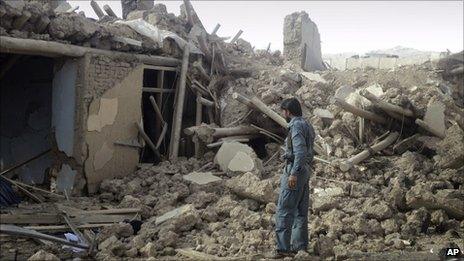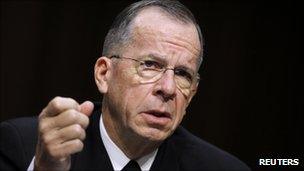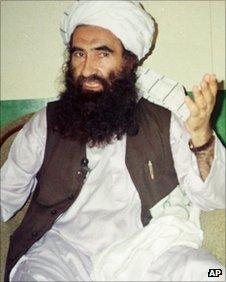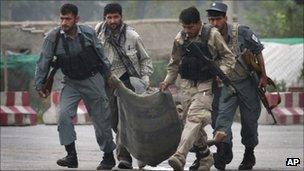Mullen mauling shows patience wearing thin with Pakistan
- Published

Admiral Mike Mullen, chairman of the Joint Chiefs of Staff, is close to retirement. Perhaps that's why he's not mincing his words.
Or perhaps a new determination is growing in the US government to force Pakistan into changing its ways.
Before a Senate hearing on Thursday, Admiral Mullen stated definitively that Pakistani intelligence was supporting militant extremists in Afghanistan as they launch attacks on US forces there.
"The Haqqani network, for one, acts as a veritable arm of Pakistan's Inter-Services Intelligence Agency," said Adm Mullen.
Rarely if ever have we heard such a senior figure make the accusation so publicly, with such specific information attached to it.
A new chapter
The admiral referred to an attack using a truck bomb, which injured nearly 80 coalition troops south of Kabul earlier this month and the attack on the US embassy and other official buildings in Kabul last week.

Adm Mike Mullen is about to retire, but not before letting fly a few choice words at Islamabad
"With ISI support, Haqqani operatives planned and conducted that truck bomb attack, as well as the assault on our embassy."
No caveats there: his language suggests that the US has conclusive proof of Pakistani support for those Haqqani operatives, not just intelligence that might suggest involvement.
Jeffrey Dessler, at the Institute for the Study of War in Washington DC, has produced influential analyses of the Haqqani network.
He has long pointed to a relationship between the Haqqanis and the Pakistani intelligence service.
But recent events, he says, are trying the patience of the White House and Pentagon.
"My sense is there's been something of a sea change within government, and now there's less of a willingness to put up with this," he says.
"The attack on the US embassy compound marked something of a new chapter. It was an attack directly on US personnel and it was very high profile."
Analysts say that the ISI helps train and resource the Haqqanis, who are allied with the Taliban.
'Proxies'
The militant group's roots lie in the war against the Soviet Union. Now it operates in Afghanistan's eastern provinces, flitting across the Pakistani border to sanctuary.
In perhaps the most telling part of his testimony, Adm Mullen attacked Pakistani grand strategy - particularly its use of militant groups like the Haqqanis as "proxies" to increase Pakistani leverage in the region.

Jalaluddin Haqqani leads the network, which was nurtured by the ISI
"They may believe that by using these proxies they are hedging their bets, or redressing what they feel is an imbalance of regional power," he said.
"Only a decision to break with this policy can pave the road to a positive future for Pakistan."
Here, the Admiral is calling on the Pakistanis to reconsider their entire approach to regional security - a very tall order and not something that would happen in a year or two, even if the Pakistanis assented.
The relationship between Washington and Islamabad appears to be hitting new lows.
Pakistan complained loudly and publicly of the American raid on Abbottabad which killed Osama Bin Laden.
'Stunning duplicity'
In July, the US announced it would withhold hundreds of millions of dollars in military aid to Pakistan.
And now, the Americans are very publicly accusing Pakistan of stunning duplicity.
The United States has a number of ways of increasing pressure on the Haqqanis and the Pakistani state.

Afghan forces in Kabul carry the body of a comrade killed during a battle with Taliban
Drone strikes and covert operations - conducted with or without the approval of the Pakistani authorities - can be directed against the militant network.
American aid - to the tune of $4bn (£2.6bn) dollars a year - can be reduced or made conditional.
But Adm Mullen was careful to say that the US was not about to cut Pakistan loose.
"What matters most now is moving forward," he said, arguing that America must work for security and prosperity in Pakistan.
It is accepted wisdom in Washington that there can be no end to conflict in Afghanistan, and no true stability in South Asia, until Pakistan enjoys a measure of stability and security.
But the Admiral's testimony indicates Washington's intense frustration at Pakistan and the lethal tactics of its shadowy intelligence services.
Where all this may lead - what options the Americans may be considering - is unclear.
But the Americans are now laying the ground for change.
- Published22 September 2011